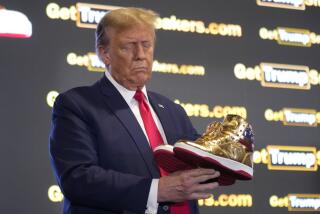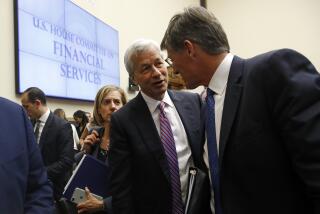Bush Defends Tax-Cut Plan; Fed Chairman Eases Criticisms
WASHINGTON — In a rare rift with Alan Greenspan, the White House took issue Wednesday with the Federal Reserve chairman’s assessment that this is not the time to boost the economy -- at least not along the course President Bush has chosen.
Using language more than a step removed from an economic textbook -- or from the carefully parsed words Greenspan chooses for formal statements -- Bush said: “If the economy needs a little extra oomph, if more money needs to go into the pockets of our people so as to encourage economic vitality, why wait?”
Although he made no mention of Greenspan by name, the influential Fed chairman clearly was his target.
Greenspan told the Senate on Tuesday that he supported Bush’s controversial call for eliminating the personal tax on dividends only if the measure did not add to the deficit; the administration estimates the measure would cut federal revenues by $385 billion.
Similarly, reflecting his concern about the red ink in the federal budget, Greenspan said he would extend the provisions of the 2001 tax cut that are scheduled to disappear at the end of the decade, but only if the extensions could be coupled with other measures so they do not drive up the deficit.
The $2.23-trillion budget Bush proposed last week forecasts a $304-billion deficit this year, a $307-billion deficit next year and deficits totaling $1.08 trillion over five years. Just two years ago, the government projected a decade of budget surpluses totaling $5.6 trillion.
Greenspan also questioned the timing of Bush’s plans, saying, “My own judgment is that fiscal stimulus is premature.”
On Wednesday, in a second day of congressional testimony, Greenspan sought to minimize the differences with the White House.
He went out of his way to praise Bush’s proposed dividend tax cut, even conceding that it might serve as a short-term stimulus for the economy, a benefit he discounted Tuesday. “One of the areas where we can do considerable good ... is to eliminate the double taxation of dividends,” Greenspan said.
Bush and other advocates of the cut contend that dividends are wrongly taxed twice, once when companies are taxed on their profits and again when shareholders receive dividends.
“Let me say parenthetically,” Greenspan added, “while I do not support the elimination of the double taxation because of a short-term stimulus, it does have some short-term stimulus.”
The Fed chairman repeated his Tuesday warning about rising deficits and said legislators should approve only new tax cuts or spending measures whose costs are covered.
But he managed to carefully separate these cautionary remarks from his comments about the president’s proposals. This prompted Rep. Barney Frank (D-Mass.), who had praised Greenspan for his deficit warnings, to express dismay.
“My strong impression,” Frank told Greenspan, “is that you are seeking now to find the maximum points of agreement to diminish the impression” that the Fed chairman opposes the latest White House package.
The gentle back-and-forth was conducted from disparate corners of the Washington community: Greenspan testifying before the House Financial Services Committee and Bush crossing the Potomac River to meet with a small group of investors at an office of brokerage firm Charles Schwab in Alexandria, Va., and then to a larger audience assembled at the Human Resources Management Assn.
The president, promoting his $674-billion package of tax cuts and other economic stimulus measures, sought to prod Congress to act quickly in speeding up provisions of the 2001 tax cut. Without additional action by Congress, some would not take effect for several years.
“You’ve been through the debate; you’ve already talked about the principles involved. Move it up,” the president said.
The trip across the Potomac and, perhaps more so, a trip Bush is making today to Florida reflect the White House effort to present the president in dual modes: pushing for a proposal he contends will pump up the economy by reducing income taxes, while conducting private diplomacy and speaking out publicly to build support for his campaign to disarm Iraq.
The president is traveling to the Mayport Naval Air Station near Jacksonville, Fla., to speak to sailors about Iraq. But he also has scheduled a meeting with a smaller audience to talk about his economic proposals.
Throughout the last two months, while public attention has been drawn to the tensions with Iraq, the White House has taken pains to demonstrate that Bush is not ignoring domestic policy issues.
The Greenspan testimony presented the White House with a difficult course. The chairman’s influence is such that his opposition could sway votes when Congress considers the Bush tax-cut proposal.
But the White House had little interest in drawing further attention to their differences.
The White House on Tuesday tried to play down Greenspan’s muted opposition.
On Wednesday, it opted to defend the president’s approach.
White House Press Secretary Ari Fleischer sought to spotlight Greenspan’s support for “fiscal restraint.”
But he acknowledged that on the subject of whether the economy needs stimulation, “the president and Chairman Greenspan have some differences.”
More to Read
Get the L.A. Times Politics newsletter
Deeply reported insights into legislation, politics and policy from Sacramento, Washington and beyond. In your inbox three times per week.
You may occasionally receive promotional content from the Los Angeles Times.










